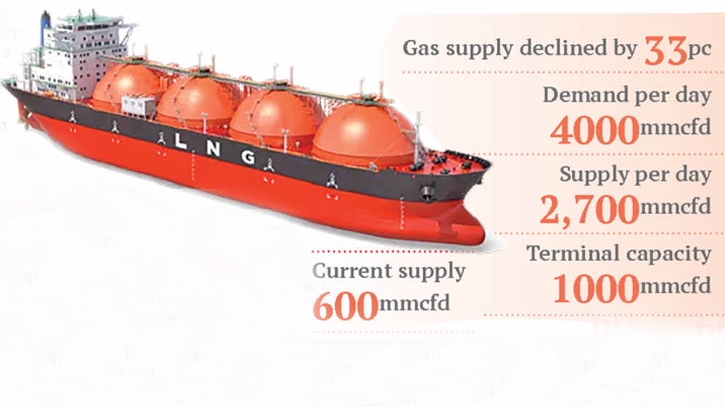
Photo : Messenger
Ordinarily, productive industries grapple with a chronic gas crisis throughout the year. Regrettably, this time, the gas shortage is set to intensify as the country ushers in winter, heralding impending hardship for the industrial sector.
Additionally, the supply of LNG to the grid will dwindle starting November 1, as the terminal in Maheskhali undergoes essential repair and maintenance.
According to Petrobangla, the gas supply has plummeted by a staggering 32.72 percent. This, in a nation with a daily gas demand of 4,000 million cubic feet, paints a bleak contrast with Petrobangla's current supply of approximately 2,700 million cubic feet.
Furthermore, on November 1, Accelerate Energy's terminal, a critical source responsible for half of the LNG supply, will commence extensive repairs. This will undoubtedly trigger a monumental gas crisis, affecting both industries and households.
Muhammad Hatem, the Executive President of the Bangladesh Knitwear Manufacturers and Exporters Association (BKMEA), emphasizes the vital role of the garment industry as the country's largest foreign currency generator. He points out that any decline in production will inevitably translate to reduced exports. Winter holds special significance for the RMG sector, as it's the time when a surge in clothing exports occurs. Hence, uninterrupted gas supply is paramount to meet this seasonal demand.
Chairman of Petrobangla, Zanendra Nath Sarker, has informed the Daily Messenger that repairs on Accelerate Energy's terminal will commence on November 1. Until October 31, around 600 million cubic feet of gas will be supplied to the grid. However, from November 1, the supply of LNG is expected to decrease further.
On the brighter side, during the winter season, the country's electricity demand decreases, resulting in lower gas requirements for power plants in electricity production, as pointed out by the official.
Mahbubul Alam, President of the Federation of Bangladesh Chambers of Commerce & Industries, urges the government to explore alternative means to manage the crisis. He underscores the current inadequacy of gas supply to industries and warns that further declines will only exacerbate the situation, leading to reduced industrial production and increased expenditure.
A Petrobangla official notes that in the previous month, the daily gas supply exceeded 2,800 million cubic feet, whereas about 3,000 million cubic feet were supplied in the month prior. The two terminals, with a combined capacity of 1,000 million cubic feet, typically provide 800 to 1000 million cubic feet to the grid. However, due to a currency crisis, the spot market has been supplying 600 million cubic feet of gas for several days. Additionally, due to maintenance work on one of the terminals, daily LNG supplies are projected to fall below 500 million cubic feet.
The import of liquefied natural gas (LNG) remains stagnant, with domestic gas supply falling short of meeting the demand. In light of this, efforts are being made to repair a floating LNG terminal at Maheshkhali. The repair work was originally scheduled for March but had to be postponed due to increased demand for gas in power plants during the intense heat. The repair process takes approximately one and a half months. Accelerate Energy also plans to augment their terminal capacity by an additional 1000 million cubic feet, a project that will span about two months.
A Petrobangla official affirms the fast depletion of domestic gas reserves and reveals that arrangements have been made to source fuel for power plants from abroad in the form of LNG. Agreements have been signed with Oman and Qatar to import LNG, with deliveries slated to commence from 2026.
Messenger/Jannatul/Fardin








